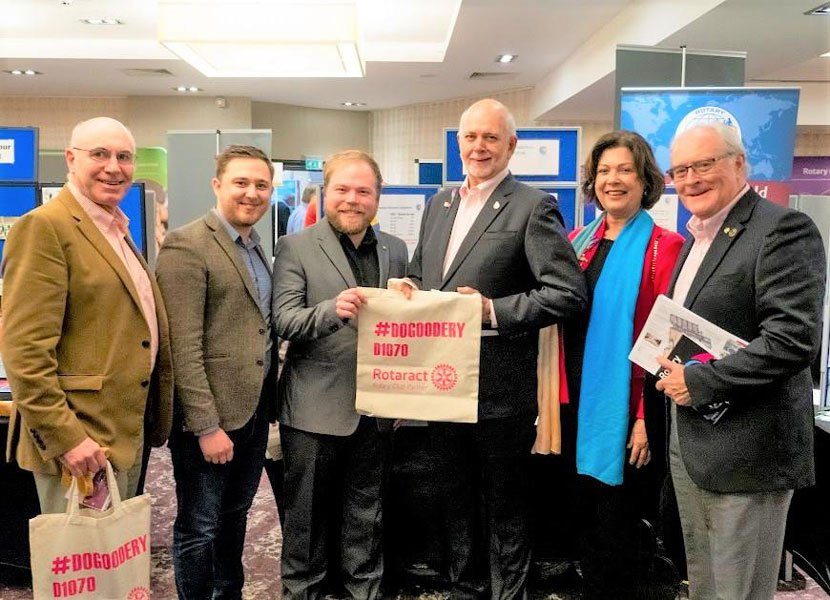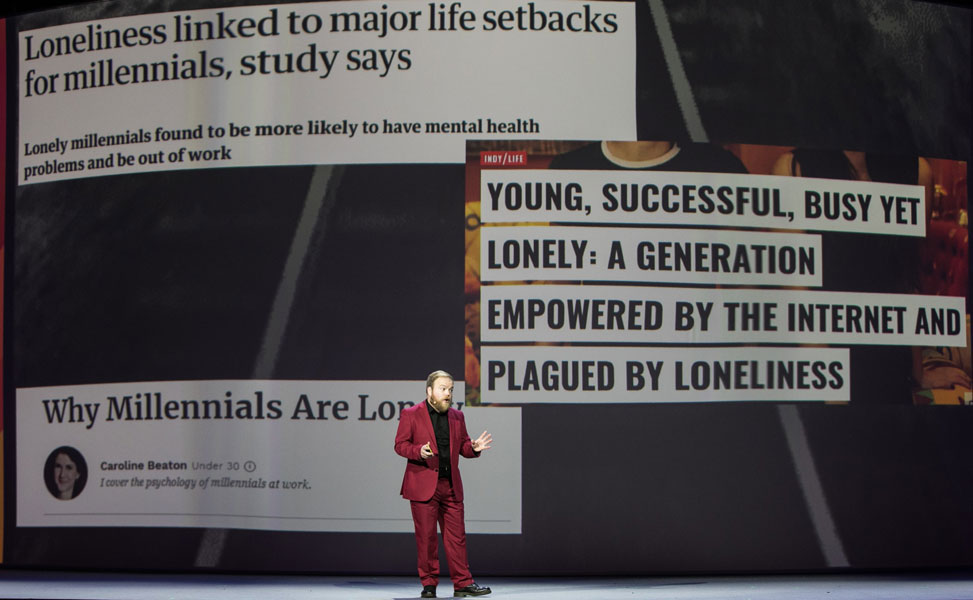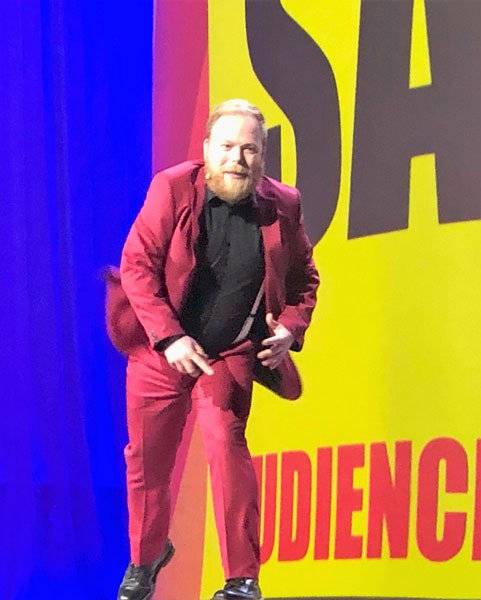A Rotaractor rocks the Hamburg Convention

For justifiable reasons, one of the highlights of the Hamburg Convention was celebrating youth leadership and exploring the energy, passion and dynamism of youth to make the world a better place, in the process, bringing down the average age of Rotarians.
So when RI President Barry Rassin invited Chris Wells, the founding past president of the Rotaract Club of Market Harborough, England, and the present DRR of RI District 1070, to make a presentation at a plenary session at Hamburg, “this was easily among the top scariest things” he had ever done, including sky diving, said Wells. But at the same time, it was a also a dream come true for him to address such a distinguished assembly of Rotarians.
Once the palpitations had abated, he did “what most people do; and that is to turn to the Internet.” But when the Net threw up all kinds of irrelevant stuff — including a lot of material on “The Lord of the Rings, I went to the Internet of people.”
We were doing great stuff for good causes and having fun while doing it. That, I believe, is the core of what the Rotary collective does.
The person he turned to for help for his keynote address was Jim Davies from RC Market Harborough, presently RIBI Rotaract Liaison, who was in the first place responsible for Wells joining Rotaract in 2015.
Striking a poignant note in an address filled with a lot of jumping and darting across the dais, hooting, laughter and fun, Wells said that in 2015, he was in a situation quite common for a lot of people in their 20s. He had graduated and had a media degree but he was feeling a bit lost and wondering about life and its very purpose. He had got an education, and then would come work, followed by taxes and then death. “Fortunately, a colleague noticed my angst and introduced me to a Rotarian (Jim Davies). I met him and asked him what does Rotary actually do? Eventually we decided to form a Rotaract club together even though I wasn’t sure what one actually was!”
Wells said that in 2015, District 1070 had only “12 Rotaractors across three clubs in a district that’s about 9,000 sq km. Back in the 1990s there were thousands of Rotaractors in that district and now there were only 12.”

Though this was the situation in many parts of England, the new club “started acquiring members by just grabbing friends, and telling them you’re one of us now! Even though we didn’t know exactly what we were doing, we met up anyway…”
Now of course he knows the answer to that question on what Rotary does: “Dogoodery, of course,” he beams!
Once the club had started, slowly magic happened; they “started doing stuff, lots of stuff, such as tinned food collection, quizzes, fundraising events, etc.” Other clubs started forming across the district and they all started growing. “We were doing great stuff for good causes and naturally we were having fun while doing it. That I believe is the core of what the Rotary collective does.”

The crux of Wells’ message was that his Rotaract club achieved a lot because “we were working along with Rotarians; we were in constant communication, were totally involved and moving towards the common goal of dogoodery!”
While the Rotarians helped the Rotaractors in overcoming many hiccups along the way in formulating and executing their projects, and of course answering all their “non-Googleable questions”, there was help flowing in the reverse direction too. The Rotaractors helped those of the Rotarians who were not as well-versed in technology; taught them how to use the social media for advertising and to open up new doors of communication. “We realised that it is this ability to work and develop together in total fellowship that can make this dogoodery much better!”
A generation empowered by the Net, yet lonely
Striking a serious note in his address packed with fun and laughter, RID 1070 DRR Chris Wells told the Hamburg Convention delegates that though at the beginning of his talk he had referred to his feeling alone and lost after completing his education as “angst, what I actually had was depression. I had all of the things you hear about depression… food had lost its taste, music its joy and the world its colour and it was really scary. I felt like I was losing myself. This is far too common for a lot of people in their 20s. It is ironic that in an age of such open and wide communication, there are increasing reports about people feeling isolated. And at tricky times like these it is very difficult to find reasons to keep going or find people to reach out to.”
Quoting a recent study, Wells said that loneliness was linked to many life setbacks for Millennials who were suffering from this social isolation. It was an irony that despite “being young, successful and busy, a generation empowered by the Internet was plagued by loneliness,” it said.
Wells made it clear that “Rotary isn’t there to cure depression and people suffering from it should not feel shy to reach out to get medical and professional help. It can be so dangerous if left unattended. But for me Rotaract really filled in some of those dark and empty spaces inside me.”
He added that he felt most fortunate that Rotary and Rotaract embraced him and “I am here today. It’s amazing. Imagine there are so many people across the world waiting for something like Rotary and Rotaract to give their life direction and make such a difference.”
(When he isn’t Rotaracting, Chris works for the non-profit Go Make A Difference which shares and develops effective thinking tools to under 25.)
